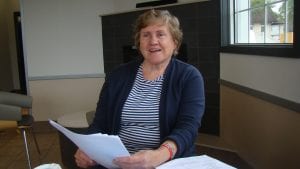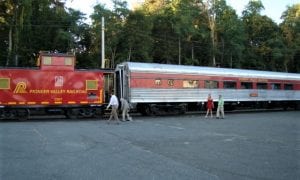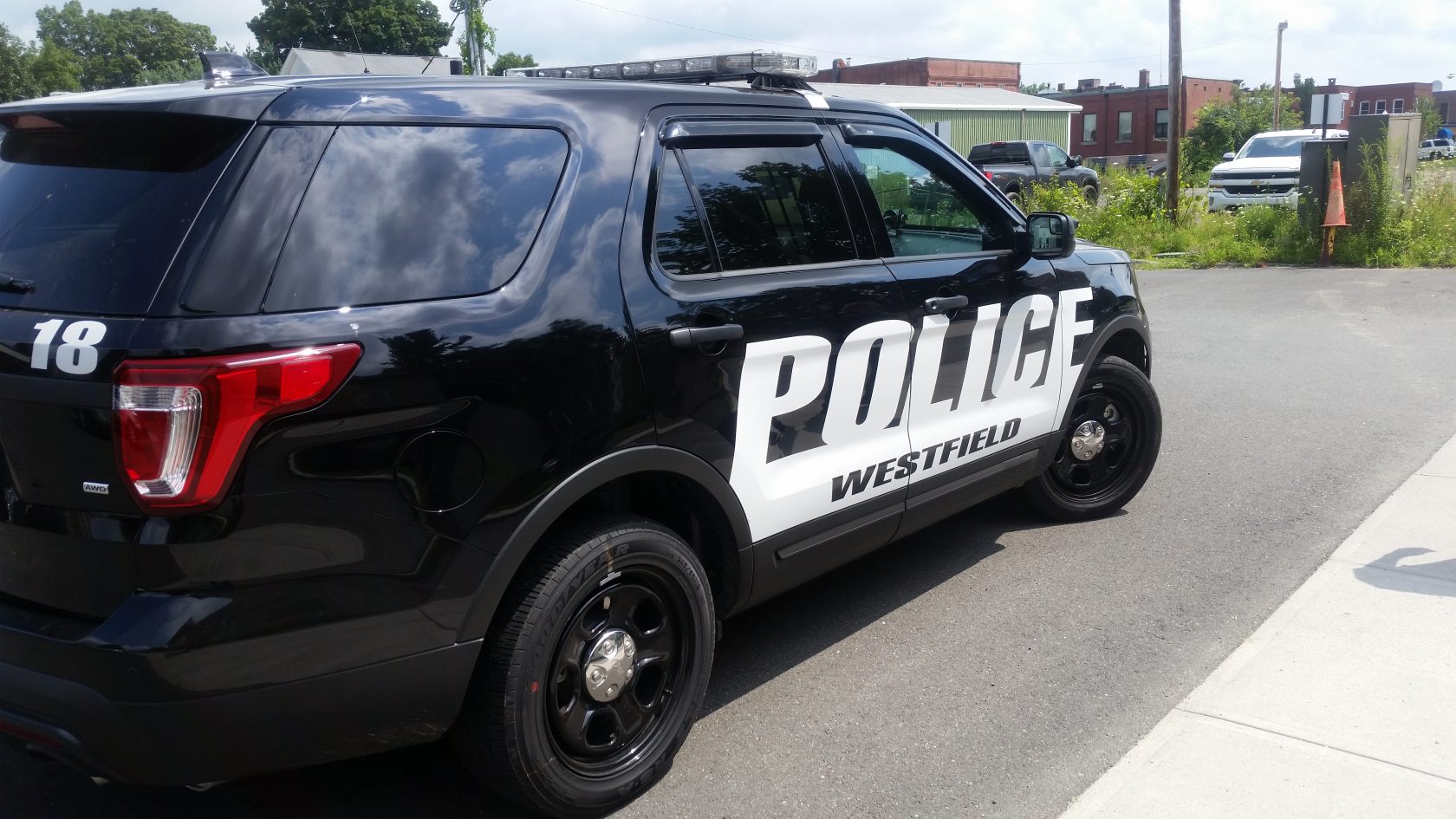WESTFIELD – If it seems as though the train has been blowing its horn more frequently through Westfield this year; that’s because it has been.
CSX wasn’t blowing its horns at private crossings until the beginning of May, when the horns started sounding. That’s when Mayor Brian P. Sullivan, Ward 1 Councilor Mary Ann Babinski, and state legislators started getting phone calls and emails.
According to Pochassic Road resident Bernie Edmunds, the horns started sounding at every crossing in the spring. “I’m right next to the tracks; three crossings within a quarter mile. It will basically blow you out of the house; sounds like it’s coming in your back door,” Edmunds said.
He said some trains blow quick horns, and some are constant through the whole stretch, at 2 a.m., 3 a.m., 4 a.m.
“In the summer time, the air conditioning helps a little. In the fall, you can’t have your windows open,” he said, adding that he contacted state Sen. Donald F. Humason, Jr.’s office and spoke to state Rep. John C. Velis shortly after it started in early May.
That’s also when Sullivan contacted Babinski about the problem, and asked her if she knew anybody on the federal level involved with trains. Babinski said she had met Lou Frangella of the Federal Railroad Administration at a safety meeting a few years ago. She called him up.
“Conversations and emails are still going on,” she said.
The first meeting on June 14 was with the mayor and aides for Humason, Velis, and Congressman Richard Neal. Frangella joined them on the phone along with another FRA representative and Scott Conti from the MassDOT to discuss what kind of actions to take to correct the situation.
Frangella, a grade cross specialist with the FRA, explained that a federal law called Positive Train Control governs how the train horns are blown. Trains have to sound the horn by law when they come to a public crossing, but the law neither requires nor prevents railroads from sounding the horn at private crossings.
CSX has made the determination to sound the horns at private crossings in New York, New Jersey and Massachusetts as a result of lawsuits holding CSX liable due to wording of current state railroad laws for accidents that resulted from not sounding the train horn at a private crossing, Frangella said.
He also explained that CSX does not blow its horn at private crossings in every state. Because of the wording of some state laws, including Massachusetts’, CSX did not feel would protect them from not blowing at every private crossing.
Massachusetts General Law Chapter 160, Section 138 states: …at least three separate and distinct blasts of such whistle sounded at the distance of at least eighty rods from the place where the railroad crosses upon the same level any public way or traveled place…”
“We knew why this was happening,” Babinski said.
New York State is in the process of modifying its state law. Frangella suggested changing the state law to model the federal law, as Ohio did. He said after the changes passed through state legislation, within 30 days the trains stopped blowing their horns at private crossings.
Another solution mentioned by Frangella was to establish a Quiet Zone, which is initiated by the city, and costs money. Establishing quiet zones provides opportunities for localities to mitigate the effects of train horn noise. In a quiet zone, railroads have been directed to cease the routine sounding of their horns when approaching crossings. Localities desiring to establish a quiet zone are first required to mitigate the increased risk caused by the absence of a horn.
Babinski said residents are doing their own research, too.
“I know we’re going to have to do a quiet zone,” said Edmunds. “Right now, my property value is gone. If the train went by, they’d walk out,” he said.
Cheri Buchanan, who has lived on Pochassic Road for 19 years, agrees.
“This year it’s just been crazy with the whistles. Wakes everybody up, gets the animals going all night long,” said Buchanan, who has three dogs. “They all have to bark. We get limited sleep now. This morning, I couldn’t go back to sleep and ended up going to work for 4:30 in the morning. Even weekends. I’m hoping that they do the quiet zone,” she added.
Babinski said that Frangella came to Westfield and drove down Pochassic Road. He said public crossings have to meet specifications, and a quiet zone has to be bookended by two public crossings.
Between Williams Road, which is equipped with lights and gates and Upper Russell Road in Huntington, the next public crossing, there are 10 private crossings. In order to enact a quiet zone, Huntington would have to be involved, and its public crossing may need an upgrade.
Frangella said the FRA has also been getting calls from people in Chester. In order to include them, it would take them to the town of Washington for the next public crossing, and would have to involve all four towns. Frangella said the city and towns would have to enact legislation, the FRA and CSX would be involved, and the costs would be considerable.
Frangella said the law change, which he recommended instead, would require legislators to submit a bill modelling the state law.
Babinski said another meeting was held on Sept. 9 with Velis and Humason, to go over the possibility of changing the state law. Everyone had a lot of questions and concerns going over the law part, such as who would be liable in each solution, she said.
Frangella, CSX Northeast Manager Richard Rohauer and Maurice O’Connell, also from CSX, Velis and his aide and Humason’s aide all attended a Sept. 30 meeting at City Hall, where more questions were answered.
“I was really happy that they came,” Babinski said, adding that the FRA and CSX have been very cooperative through the whole process.
Rohauer had also come to Westfield in August, and recommended installing private crossing signage with stop signs at all locations.
Meanwhile, residents came up with a third option, and are putting together a petition. Section 139 of M.G.L. Chapter 160 states: “upon petition, and after notice to the railroad corporation and a public hearing, may, for good cause shown, recommend… such changes… of sounding of whistles on locomotives, and it may by written order forbid or regulate the sounding of whistles on the locomotives.”
Currently, the legislators are checking to see if that law still applies. “That’s the piece we’re waiting on. It’s a labilities issue,” Babinski said, adding that she is trying to push the legislators for the best direction.
Babinski also hopes to have a public meeting once they get their answers. She said Massachusetts is not the only state that’s going through this. Meanwhile, she has been regularly communicating with residents on what’s going on.
“We’re hoping that some of these meetings will be public, and they’ll find out how many people are upset,” said Edmunds.






